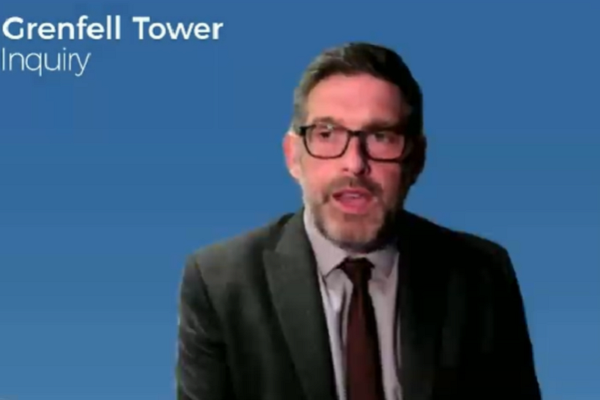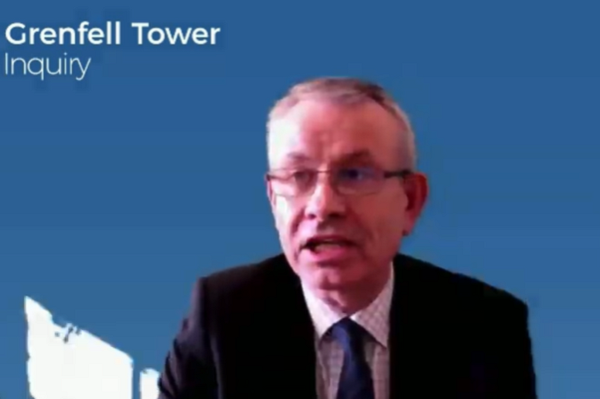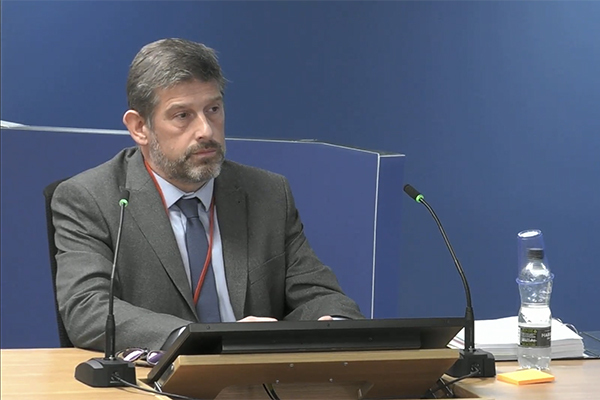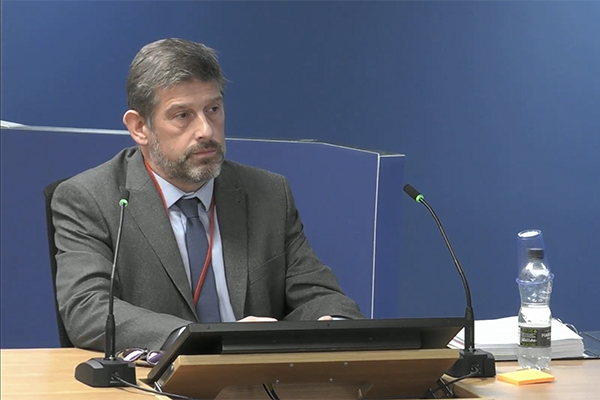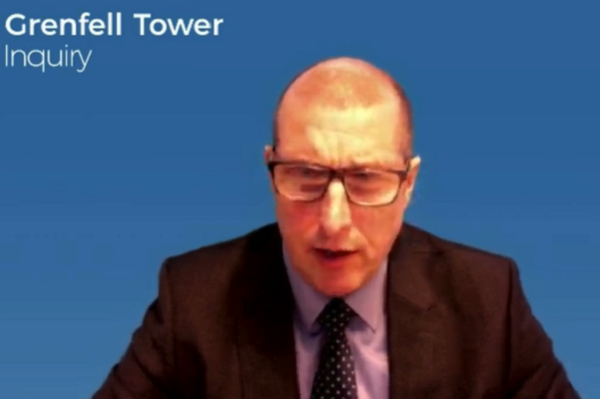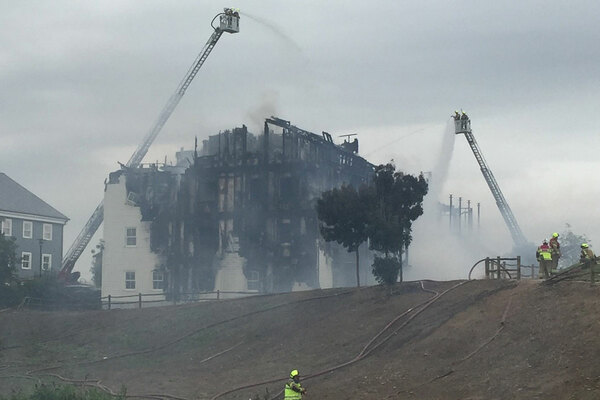Kingspan director denies attempt to ‘mislead’ MPs by ‘concealing’ cladding tests
A senior Kingspan director today denied attempts to “mislead” MPs investigating the dangers of cladding systems after Grenfell by “concealing” testing it carried out on non-combustible cladding systems.
Adrian Pargeter, director of technical, marketing and regulatory affairs for a UK division of the Irish insulation giant, returned to the public inquiry today to answer further questions about the firm’s efforts to lobby government after the fire.
When he first gave evidence in December, he was asked about emails that appeared to show that the company deliberately introduced weaknesses into a test on a non-combustible system in May 2018, as it sought to prove that these systems were also potentially dangerous.
The inquiry had previously heard that this test data was submitted to a select committee of MPs investigating the dangers of cladding systems after the fire, without the committee being informed of the deliberate flaws.
But Kingspan has since written to government to claim that these questions were put in error, saying that the select committee was in fact told about a different test in July 2018 that included no deliberate design faults.
Today it emerged that the test in May with the deliberate weaknesses had in fact passed, while the July test, which did fail, was carried out using a cladding panel expected to perform poorly in a fire.
Richard Millett QC, counsel to the inquiry, suggested today that in not explaining this clearly, Kingspan attempted to “mislead” the select committee, something Mr Pargeter denied.
In 2018, the government was considering introducing a ban on combustible materials – a move that would have eliminated Kingspan’s ability to sell its insulation for use on high rises.
As a result, the firm was seeking to demonstrate that non-combustible systems could also be dangerous, as it pushed for large-scale testing of entire systems rather than a distinction between combustible and non-combustible products.
The inquiry saw an email sent by Gilbert McCarthy, the firm’s managing director, on 31 May 2018, which said that chief executive Gene Murtagh was “very clear we need to pull out all the stops to convince [government] and anyone who wants to listen… that large scale testing is the ‘right and only’ solution to ensuring maximum public safety”.
Kingspan initially sought to obtain a fail on a non-compliant system in a test held in Dubai on 22 May. Internal emails show that this system had been designed “to allow the flames to bypass the vertical cavity barriers”, as well as other weaknesses.
But despite the deliberate inclusion of these elements, the test achieved a pass. Asked if this “dealt something of a blow” to its lobbying position, Mr Pargeter accepted today that it “was a disappointment”.
But he did not mention that this May test had passed when he first gave evidence in December, claiming today that he forgot about it under the pressure of cross examination. He denied that this was “not credible”, when challenged by Mr Millett.
As a result of the test passing in May, Kingspan moved to what was described by Mr Pargeter in emails as “Plan B”.
It had learned of a cladding product on the market, branded Vitracore G2, which was believed to perform poorly in a fire, despite having a rating of ‘limited combustibility’. Emails show Kingspan employees saying it would “go up like [polyethylene] panels [the variety used on Grenfell Tower]”.
An internal email shows senior members of the team concluding that a failure of a system with Vitracore cladding and non-combustible insulation would be “incredibly politically damaging” as it would result in headlines saying cladding systems thought to be safe under the new regulations were in fact dangerous.
This test was carried out in Dubai and resulted in a failure, which Kingspan then passed to the BBC and presented to the select committee of MPs.
However, it did not mention the test in May, which had passed, or the fact that Vitracore had been selected due to existing concerns about its potential fire performance.
Asked if Kingspan “concealed” the May result from the select committee because “it undermined the case” that non-combustible systems could be dangerous, Mr Pargeter accepted that it “didn’t support the case we were trying to make”.
“I have to put it to you that in not putting the successful May test to the select committee, Kingspan was attempting to mislead the select committee?” asked Mr Millett.
“No, I disagree,” said Mr Pargeter.
“And the reason you didn’t mention the May test in your second witness statement was for exactly the same reason: your plan was always to conceal the fact of the May test from the inquiry and the public?” asked Mr Millett.
“No, that’s not true,” said Mr Pargeter.
“And it’s only once it was put to you that the July test was part of an effort to mislead the select committee that you chose to come clean about the May test and sought to put the record straight?” said Mr Millett.
“No, that’s not true,” said Mr Pargeter.
Following the test, investigations by the government revealed that Vitracore should not have been given its rating of limited combustibility – something the manufacturer of the product challenged.
Internal Kingspan emails then show staff saying that this development “killed our failed [test]”, meaning it was no longer useful as a lobbying tool against non-combustible systems.
In the end, the government banned combustible materials on buildings taller than 18m despite Kingspan’s lobbying, although a mooted extension of this ban to 11m remains unimplemented.
Earlier in the day, the inquiry heard the conclusion of evidence from John Albon, chief scientific officer at the British Board of Agrément (BBA).
The BBA provided certificates for the combustible cladding panels used on Grenfell Tower, as well as the Kingspan K15 insulation that made up a proportion of the insulation on its walls.
After being taken through various failures in these certificates, Kate Grange, counsel to the inquiry, asked Mr Albon if he agreed that its work “fell a long way short” of the standards of excellence it claimed on its website.
Mr Albon said he regretted the errors, but added that they were based on information provided by the manufacturers of the products.
“Do you accept that the BBA has shown itself to be toothless and weak in its dealings with these product manufacturers?” she asked.
Mr Albon said he “did not accept this at all” and emphasised that the BBA withdrew the cladding certificate when it was made aware of test failures after the Grenfell Tower fire.
The inquiry continues.
Sign up for our weekly Grenfell Inquiry newsletter
Each week we send out a newsletter rounding up the key news from the Grenfell Inquiry, along with the headlines from the week
Already have an account? Click here to manage your newsletters
